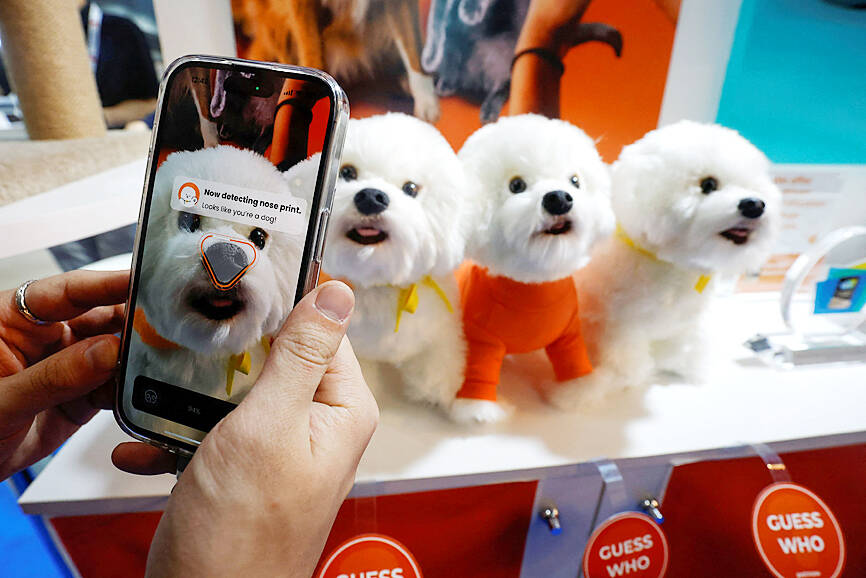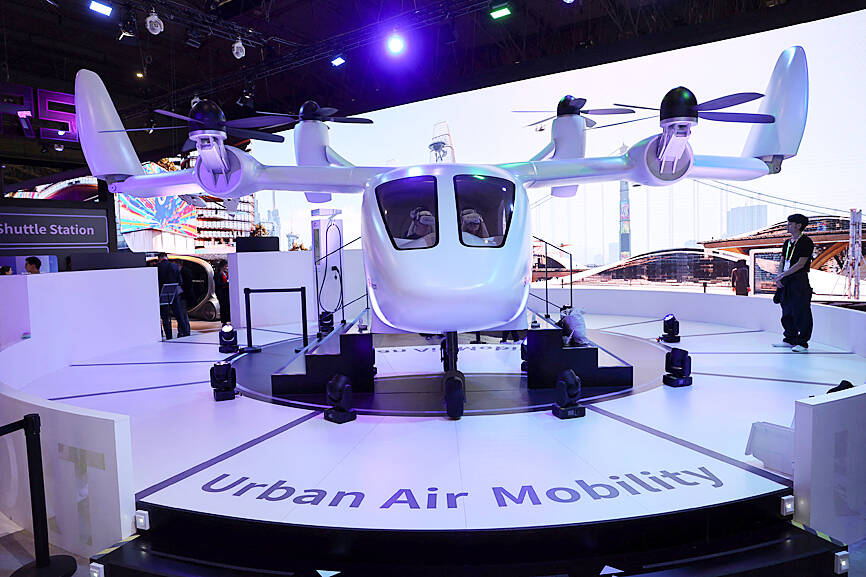The Mobile World Congress (MWC) is primarily a gathering for the bigwigs of the telecoms industry, but far from the main thoroughfares of the vast conference there are always hidden tech gems.
Among the most offbeat products spotted at last week’s event was artificial intelligence (AI) clone technology.
As advertising slogans go, “you can live forever” is up there with the best.

Photo: Reuters
That is how Memori Yamato described the “personalized AI clone” from her Japanese company Alt Inc.
“Your descendants can continue to speak and interact with you, even after your death,” Yamato said.
The idea is to upload as many videos, images and audio samples as you can while alive.

Photo: Reuters
The system would use that data to generate an AI mirror, cloning you in the digital world.
“It will look like you, it speaks in your voice and it even thinks like you,” she said.
The idea has been nine years in the making, and feedback from early users suggests the technology has nailed appearances and voices, she said.
NOSEPRINT
A dog’s nose carries similar identifying traits as a human fingerprint. South Korean start-up Petnow Inc took this information and ran with it — like a dog after a stick — to create a biometric database of pets based on noseprints rather than microchips.
“Since the 1940s, we’ve known that dogs’ noses worked a little like fingerprints,” Petnow business development manager Peter Jung said.
About 100,000 animals are abandoned each year in South Korea, often because owners cannot afford vet bills, he said.
“Less than 10 percent have chips because people don’t like the process,” he said.
Petnow just requires a photo and AI does the rest, ensuring the photos are good enough for identity purposes.
Jung said that 50,000 pet owners have signed up since last year, and he hopes the government will change the rules to allow his system to replace chips.
Cat lovers need not worry.
Their noses might be too petite to be identifiable, but each feline face is unique and can be used in the system, the company said.
TAKING FLIGHT
A staple from the pages of science fiction and the dreams of the superrich, flying taxis could be available as soon as 2025, SK Telecom Co said.
At the MWC, some attendees got an early taste, thanks to virtual reality headsets and a prototype complete with juddering seats.
Halfway between a helicopter and a drone, the craft has six electric motors that allow vertical takeoffs and landings.
It can carry up to four passengers and move at speeds of up to 320kph.
South Korea’s biggest telecoms provider developed it with Californian start-up Joby Aviation and hopes it will solve congestion in South Korea’s cities without adding to global warming.
“In Korea, in urban areas, we have severe traffic congestion, but constructing a mass transportation system like a highway or subway needs many social costs,” SK Telecom manager Ken Wohn said.
“Using this UAM [Urban Air Mobility] service can shorten our customers’ travel time without making so much infrastructure,” he said.
NEVER ALONE
People might live their later years in the company of “socially intelligent” robots capable of “building an emotional relationship” with them.
That is the vision of Spanish technology outfit Eurecat, which has developed a robot called NHOA — or “never home alone.”
It is designed to reduce the loneliness of older people living at home.
The orange and white robot stands 160cm tall and can be controlled with a touchscreen and by voice.
Eurecat healthcare innovation manager David Mari said the aim was not to replace human relationships, but to “humanize” the applications and connected objects used by older people.

In Italy’s storied gold-making hubs, jewelers are reworking their designs to trim gold content as they race to blunt the effect of record prices and appeal to shoppers watching their budgets. Gold prices hit a record high on Thursday, surging near US$5,600 an ounce, more than double a year ago as geopolitical concerns and jitters over trade pushed investors toward the safe-haven asset. The rally is putting undue pressure on small artisans as they face mounting demands from customers, including international brands, to produce cheaper items, from signature pieces to wedding rings, according to interviews with four independent jewelers in Italy’s main

Japanese Prime Minister Sanae Takaichi has talked up the benefits of a weaker yen in a campaign speech, adopting a tone at odds with her finance ministry, which has refused to rule out any options to counter excessive foreign exchange volatility. Takaichi later softened her stance, saying she did not have a preference for the yen’s direction. “People say the weak yen is bad right now, but for export industries, it’s a major opportunity,” Takaichi said on Saturday at a rally for Liberal Democratic Party candidate Daishiro Yamagiwa in Kanagawa Prefecture ahead of a snap election on Sunday. “Whether it’s selling food or

CONCERNS: Tech companies investing in AI businesses that purchase their products have raised questions among investors that they are artificially propping up demand Nvidia Corp chief executive officer Jensen Huang (黃仁勳) on Saturday said that the company would be participating in OpenAI’s latest funding round, describing it as potentially “the largest investment we’ve ever made.” “We will invest a great deal of money,” Huang told reporters while visiting Taipei. “I believe in OpenAI. The work that they do is incredible. They’re one of the most consequential companies of our time.” Huang did not say exactly how much Nvidia might contribute, but described the investment as “huge.” “Let Sam announce how much he’s going to raise — it’s for him to decide,” Huang said, referring to OpenAI

Nvidia Corp’s negotiations to invest as much as US$100 billion in OpenAI have broken down, the Wall Street Journal (WSJ) reported, exposing a potential rift between two of the most powerful companies in the artificial intelligence (AI) industry. The discussions stalled after some inside Nvidia expressed concerns about the transaction, the WSJ reported, citing unidentified people familiar with the deliberations. OpenAI makes the popular chatbot ChatGPT, while Nvidia dominates the market for AI processors that help develop such software. The companies announced the agreement in September last year, saying at the time that they had signed a letter of intent for a strategic